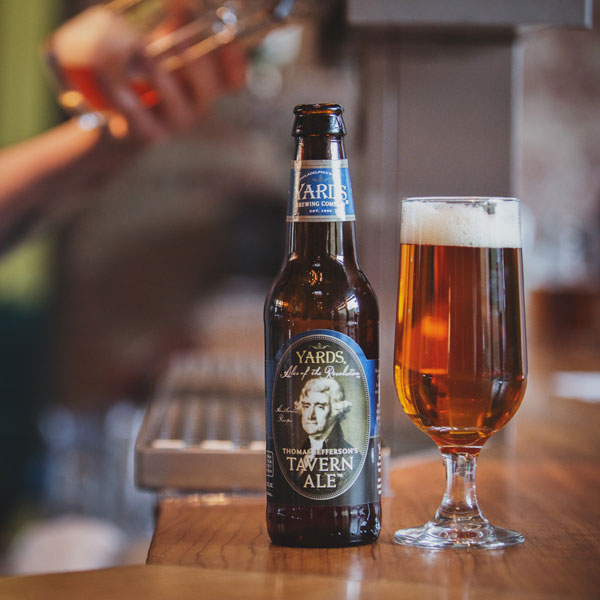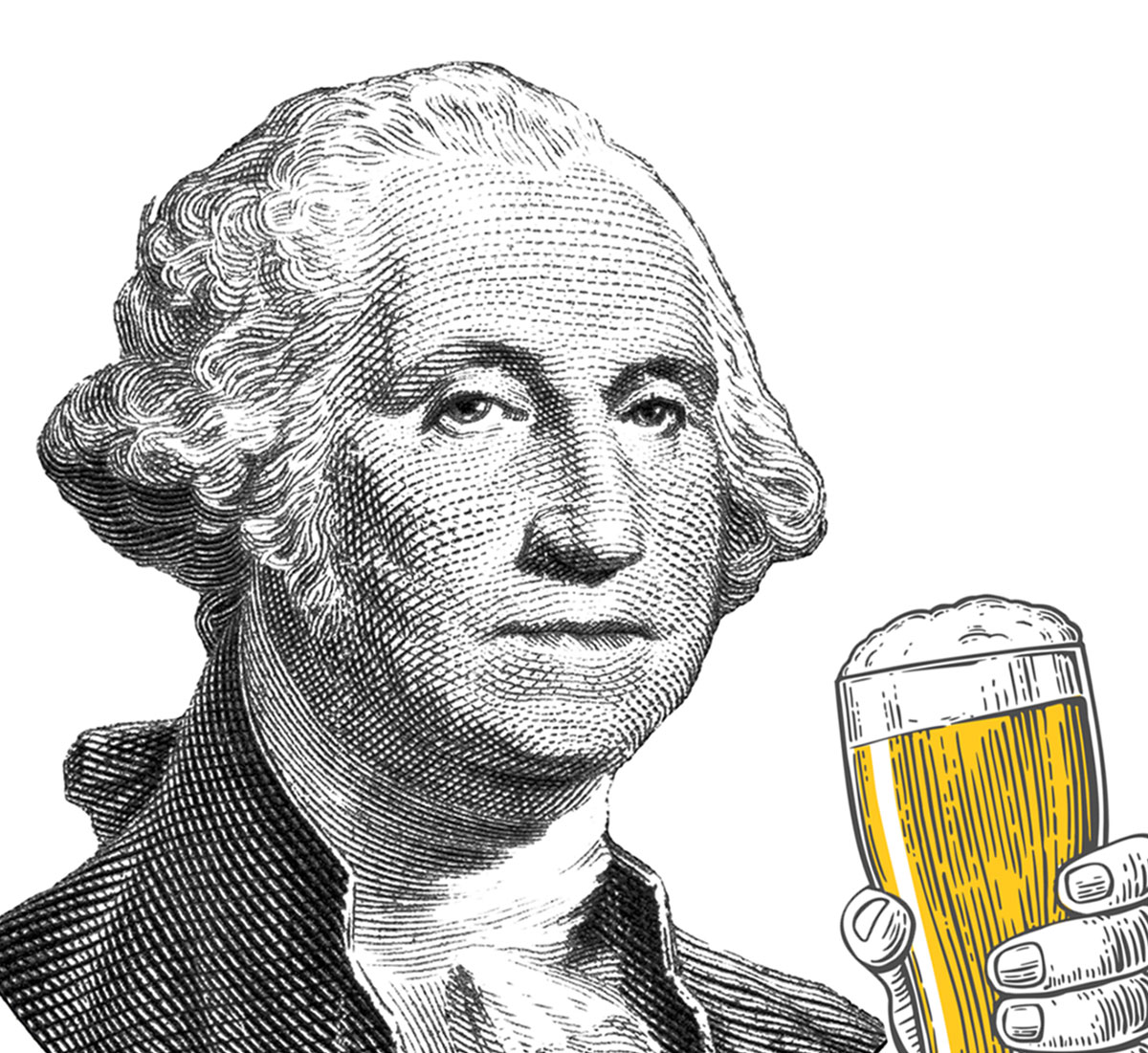There is no evidence that any president brewed beer in the White House until Barack Obama made a White House Honey Brown Ale in 2011. It created quite a buzz in the beer world, and the American Homebrewers Association made him a lifetime member.
Obama isn’t the first U.S. commander in chief to openly express his love of beer. George Washington and Thomas Jefferson were known as avid homebrewers (and whiskey and winemakers). They made far more beer and spent far more time thinking about beer than Obama could ever spend in today’s world. (Lucky for him, the White House didn’t exist back then, so his place in presidential beer history, and in Washington D.C.’s brewing history, is forever cemented.)
(MORE: 8 Beers to Share with Favorite TV & Movie Presidents)
For beer-soaked tributes to our past presidents, one must look not in Washington D.C., but in America’s first capital: Philadelphia. There, a local craft brewer and a historic tavern linked up nearly two decades ago to brew a series of beers called the “Ales of the Revolution.” Using notes and recipes gathered from letters and journals, Yards Brewing Co. and City Tavern recreated the beers of our founding fathers, including General Washington’s Tavern Porter and Thomas Jefferson’s Tavern (Strong) Ale.
Historic City Tavern Makes a Call to Arms
It all started in 1999 at City Tavern, a pub that was, amazingly enough, operating at the time George Washington, Thomas Jefferson and Ben Franklin all walked these cobblestone streets. Back then, it was simply a tavern of the times, one of many. Today, nearly 250 years later, it’s the last of its kind, and to step through the doors is to travel back to the city’s colonial days. The atmosphere and menu are completely dedicated to the era of the American Revolution.
It also serves the preferred drink of the time: beer. But not just any beer. City Tavern wanted to make sure the beer on tap had historical roots. They did some research into the drinking habits of the founding fathers, including two of the most prominent beer drinkers, former Presidents George Washington and Thomas Jefferson.
“They did enough research to know that Jefferson made a ‘strong beer’ and that Washington talked a lot about porters,” said Yards’ Brewmaster Tom Kehoe. “But before we came along, they were just buying someone else’s beer and calling it ‘Washington’s Porter.'”
In the late 90s, as Americans were beginning to embrace craft beer, Kehoe met with City Tavern about an upgrade. Instead of just renaming beers that were independently made, why not brew beers that stayed true to, or at least paid homage to, the original recipes written down by Washington and Jefferson?
The Recipes Are Revived
In the late 90s, as the world prepared for the Millennium, Yards got busy going back through time to revive the recipes. Thanks to the letter writing traditions of our founding fathers, the Revolutionary period is well-documented, and Kehoe was able to retrieve firsthand accounts of Washington and Jefferson’s affinity for beer. What’s amazing is that these letters and notes don’t just make references to enjoying beer — they often go in-depth and specifically advise how to make it.
Kehoe started the platform for Washington’s Porter with a recipe that Washington wrote down in his notebook in 1757 (the original is at the New York Public Library) about how to make “small beer” (low-quality, low-alcohol) in the field. Take a large Sifter full of Bran Hops to your Taste — Boil these 3 hours. Then strain out 30 Gall. into a Cooler put in 3 Gallons Molasses while the Beer is scalding hot or rather drain the molasses into the Cooler. Strain the Beer on it while boiling hot let this stand til it is little more than Blood warm. Then put in a quart of Yeast if the weather is very cold cover it over with a Blanket. Let it work in the Cooler 24 hours then put it into the Cask. leave the Bung open til it is almost done working — Bottle it that day Week it was Brewed.
In the end, Kahoe made a few tweaks to Washington and Jefferson’s original recipes in order to make them consumer friendly in today’s world. First and foremost, these old-school recipes had to be interpreted for the modern brewing system. For example, what exactly did Washington mean when he said to let the beer stand until it was a “little more than blood warm?” And though Jefferson talked an awful lot about beer making in his letters, he never wrote it all down in one place.
“Jefferson claimed to have no recipe, but if you do enough research it’s clear to see what he was trying to do,” said Kehoe. “He talked about using twice the grain in the beer because it made it stronger and greater flavor. But it was challenging because both had some old-school brewing techniques that were hard to follow. Like [when Jefferson said] to heat the mash up until you could no longer see your reflection in the water.”
These measurements of that era, and the ingredients used along with them, didn’t always directly translate into a “good beer” by today’s standards. Kehoe said the amount of molasses Washington used, often to brew beer out in the battlefield, made sense given the conditions and what was available at the time. However, when he replicated that amount exactly, it created a beer that was over-the-top sugary.
Jefferson’s recipe also had to be scaled back. As a strong beer, it was probably between 11 and 13 percent alcohol, Kehoe said, given the ingredients and methods used. Kehoe decided to bring it down to 8 percent for the sake of drinkability at City Tavern.
(MORE: 9 Breweries to Follow on Instagram)
Getting to Know Presidents Through Their Beer
 Over the course of the last decade and a half, the “Ales of the Revolution” have become a signature line and defining brand for Yards. Even today, more than 15 years after its release, the Thomas Jefferson Strong Beer is its fourth best-selling beer, and both are still on tap at City Tavern. It was such a success that in 2005, Yards released a third beer in the series, Poor Richards Tavern Spruce, in honor of Ben Franklin. All three are widely available and distributed by the brewery.
Over the course of the last decade and a half, the “Ales of the Revolution” have become a signature line and defining brand for Yards. Even today, more than 15 years after its release, the Thomas Jefferson Strong Beer is its fourth best-selling beer, and both are still on tap at City Tavern. It was such a success that in 2005, Yards released a third beer in the series, Poor Richards Tavern Spruce, in honor of Ben Franklin. All three are widely available and distributed by the brewery.
Kehoe said he learned a lot about our founding fathers through this process, and much of the insight comes from the beers they brewed and how they talked about them.
“One thing I learned was that these [presidents] were all very different people,” said Kehoe. “Thomas Jefferson probably brewed a strong beer because he was into agriculture. He was also a thinker, and so he probably preferred a stronger beer.”
For Kehoe, Washington’s love of porters went beyond the beer itself. Maybe, just maybe, he was parlaying beer into something much bigger.
“Washington had a passion for porters, and he always talked about the porters made here in Philly, about how they were as good if not better than any porter in England,” Kehoe said. “I think he was trying to get people to see that, ‘Hey, we can be good here, we don’t have to keep relying on mother England.'”
Two hundred forty years and 43, soon to be 44, presidents later, looks like good old George was right after all.
CraftBeer.com is fully dedicated to small and independent U.S. breweries. We are published by the Brewers Association, the not-for-profit trade group dedicated to promoting and protecting America’s small and independent craft brewers. Stories and opinions shared on CraftBeer.com do not imply endorsement by or positions taken by the Brewers Association or its members.


Share Post